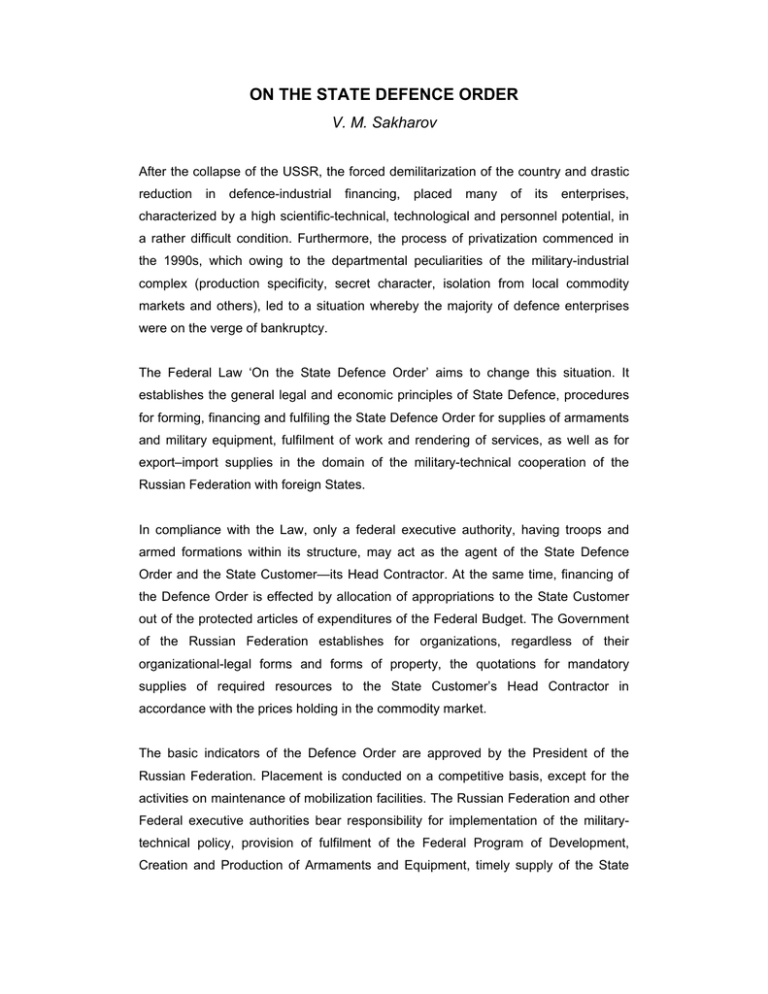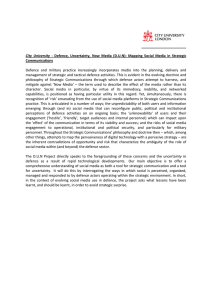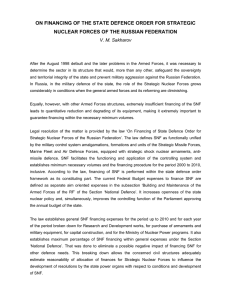ON THE STATE DEFENCE ORDER V. M. Sakharov
advertisement

ON THE STATE DEFENCE ORDER V. M. Sakharov After the collapse of the USSR, the forced demilitarization of the country and drastic reduction in defence-industrial financing, placed many of its enterprises, characterized by a high scientific-technical, technological and personnel potential, in a rather difficult condition. Furthermore, the process of privatization commenced in the 1990s, which owing to the departmental peculiarities of the military-industrial complex (production specificity, secret character, isolation from local commodity markets and others), led to a situation whereby the majority of defence enterprises were on the verge of bankruptcy. The Federal Law ‘On the State Defence Order’ aims to change this situation. It establishes the general legal and economic principles of State Defence, procedures for forming, financing and fulfiling the State Defence Order for supplies of armaments and military equipment, fulfilment of work and rendering of services, as well as for export–import supplies in the domain of the military-technical cooperation of the Russian Federation with foreign States. In compliance with the Law, only a federal executive authority, having troops and armed formations within its structure, may act as the agent of the State Defence Order and the State Customer—its Head Contractor. At the same time, financing of the Defence Order is effected by allocation of appropriations to the State Customer out of the protected articles of expenditures of the Federal Budget. The Government of the Russian Federation establishes for organizations, regardless of their organizational-legal forms and forms of property, the quotations for mandatory supplies of required resources to the State Customer’s Head Contractor in accordance with the prices holding in the commodity market. The basic indicators of the Defence Order are approved by the President of the Russian Federation. Placement is conducted on a competitive basis, except for the activities on maintenance of mobilization facilities. The Russian Federation and other Federal executive authorities bear responsibility for implementation of the militarytechnical policy, provision of fulfilment of the Federal Program of Development, Creation and Production of Armaments and Equipment, timely supply of the State Customer with monetary funds for advancing and payment of the products (works, services) and fulfilment of other work within the Defence Order. The Law aims, on the one hand, to assist in the extrication of the military-industrial complex out of crisis, and, on the other, to make its functions transparent, which in principle creates conditions for the establishment of civil control over military production. The Law expands transparency of the military budget and creates a legal basis of control over its implementation. With its adoption, the situation in this domain has started to improve. As a result, the increase of the military-industrial complex’s share in Russian exports is provided not only on account of the expansion of armaments and equipment sales, but also owing to the highly technological doubleuse of products. Nevertheless, there is necessity for further revision of the Law. The State Defence Order, which is formed in compliance with the Federal Program of Development, Creation and Production of Armaments and Equipment, developed for a ten-year period (1995-2005), is updated every financial year by adoption of relevant laws or introduction of amendments and additions to the Federal Law ‘On the State Defence Order’. There was, for instance, the adoption of the Law ‘On Urgent Measures Related to Provision of Financing the State Defence Order for 1996 and 1997’ on January 24, 1997 in relation to non-compliance by the State of its obligations to the customer.. In 1999, the events in Northern Caucasia led to a total revision of the State Defence Order and to an increase of 4 billion rubles. The text of the Law under consideration itself was amended on February 26, 1997 and May 6, 1999. In January 2002, the State Duma presented a bill for consideration on the introduction of amendments. It inteded to open opportunities to attract off-budgetary funds and to advance payments of foreign customers in the financing the exports of the State Defence Order





